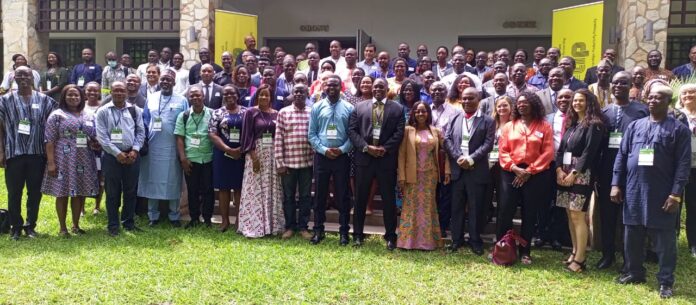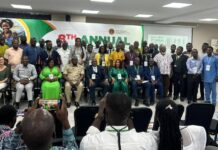To develop actionable and outcome-oriented strategies to address the challenges of fluctuating prices facing Ghana’s fertilizer and agro-input market, the African Fertilizer and Agribusiness Partnership (AFAP), in partnership with Feed the Future Policy LINK, has met to discuss innovative approaches to improving the availability and affordability of fertilizer and agro-input to smallholder farmers in Ghana and across Africa.
The conference, themed ‘The Future of Fertilizer and Agro-inputs in Ghana Towards the Soil Health Summit,’ to be held in Senegal in June 2023 aimed to address the challenges impacting local supply chains and their negative consequences on the country’s fertilizer and agro-inputs sectors.
The discussion came at a time when stakeholders believe that government must help to address fertilizer and agro-input price fluctuations and disparities in the local market to protect farmers’ interests and guarantee them sustainable livelihoods.
The conference brought in more than 100 key stakeholders from government agencies, academia, farmer groups, the private sector, and other African nationals including notable participation by Yaw Frimpong Addo, Member of Parliament, Deputy Minister, Food and Agriculture Ghana, Godfred Seidu Jaswa, Ranking Member for the Select Committee of Food, Agriculture and Cocoa Affairs at the Parliament of Ghana and Prof. Richard Mkandawire, Director of Africa Secretariat, Alliance for African Partnership (AAP), among others to discuss approaches to improving the availability and affordability of fertilizer and agro-input to smallholder farmers.
Speaking at the roundtable conference in Accra, Deputy Minister at the Ministry of Food and Agriculture Ghana, Hon. Yaw Frimpong Addo, disclosed that the Government will need about two billion dollars to establish a fertilizer plant in Ghana to increase the volume of production and resolve the intermittent shortage of the commodity, which affects food production and security.
According to him, fertilizer production must be crop specific to ensure farmers increased productivity adding that the Fertilizer Council was undertaking national advocacy to promote organic fertilizer use, especially for vegetables, to facilitate all-year-round production.
“The Ministry would speed up the plan to establish the fertilizer plant because Ghana is blessed with gas deposits, which would facilitate the establishment of the plant and help to cut down costs.
“We need public, and private partnerships to establish the fertilizer plant because we are all promoting Integrated Soil Fertility Management System to combine both organic and inorganic fertilizers to increase production levels and improve soil fertility and Government is committed to supporting and providing the enabling environment for us to achieve it,” he said.
Ranking Member, of Parliament Select Committee on Food, Agriculture and Cocoa Affairs, Dr. Godfred Seidu Jasaw, supported the call by the minister adding that public, private partnership is critical, especially at this time that we facing fluctuating prices in Ghana’s fertilizer and agro-input market.
“This would ensure availability and affordability of the commodity by small-holder farmers to improve yield” he added.
Chief Executive Officer, of AFAP, Michael Sudarkasa, emphasized the need for partnerships and collaboration in addressing the challenges facing the fertilizer and agro-input sectors in Ghana and across Africa.
He revealed that AFAP is committed to working with all stakeholders to develop practical solutions to the challenges facing the agriculture sector in Ghana.
Country Lead for Feed the Future Policy LINK, Yunus Abdulai, expressed his appreciation for the active participation of all stakeholders and noted that the discussions would inform the development of evidence-based policy recommendations to support the fertilizer and agro-input sectors in Ghana.
“We are helping deal with agriculture trade facilitation, seeds, fertilizer, access to finance, and climate change as the five key areas the organization focused on to ensure a holistic solution to the sector challenges” he added.
Director, of Alliance for African Partnership, Professor Richard Mkandawire, recommended the building of robust small and medium-scale enterprises in the fertilizer value chain to boost production.
“We need the private sector and government to drive the change and transformation of the agriculture sector by leading the advocacy, building infrastructure to ensure accessibility and affordability of fertilizer, and investing in research and extension services to enhance the growth of the sector” he pointed out.








